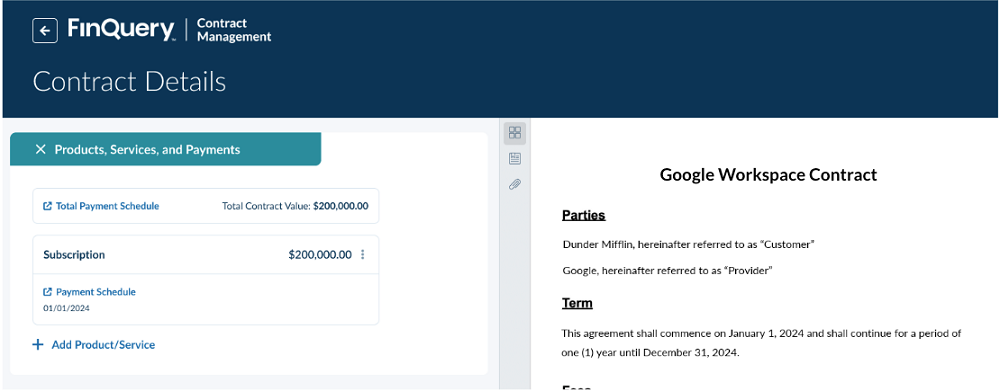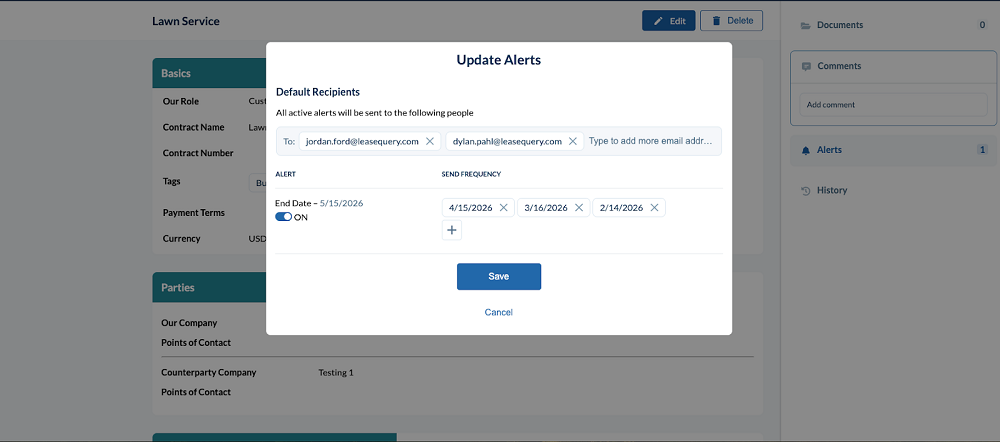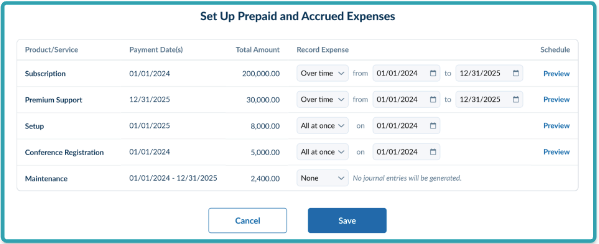Contracts are the backbone of business operations. From sales orders to vendor agreements like supply arrangements, leases, and SaaS subscriptions, contracts govern relationships and create commitments and obligations. Effective contract management is vital for organizations to minimize risks, maximize value, and maintain compliance.
What is contract management?
Contract management is the umbrella term for the process of centrally monitoring an organization’s contracts to optimize its operations and financials. It can encompass all types of contracts, from sales and vendor agreements to complex multi-party partnerships. It can cover the entire process of creating, negotiating, executing, storing, analyzing, and renewing or terminating contracts.
Why is contract management important?
An organization may be handling hundreds of contracts at any given time, making contracts both numerous and important. They underlie most business transactions or relationships and define obligations, expectations, and rights. Without a systematic approach, contract management can quickly become chaotic and inefficient. Organizations with no formal system or who manage contracts manually in Excel or shared drives commonly experience challenges like:
- Missed Deadlines: Missing key dates can lead to financial penalties, missed opportunities, or even legal disputes.
- Non-compliance: Failure to adhere to contract terms can damage relationships and incur significant costs.
- Inefficient Processes: Manual contract management is time-consuming, prone to errors, and can hinder productivity.
- Lack of Visibility: Scattered contract data makes it difficult to track obligations, identify risks, and make informed decisions.
What is contract management software?
To overcome these challenges and streamline contract management, many organizations will invest in contract management software (CMS). A CMS automates and streamlines many aspects of the contract management process, providing a central repository for storing contracts and facilitating collaboration among stakeholders. Depending on the type of CMS an organization invests in, it can also support contract creation, automate workflows such as e-signature, and provide analytics and reporting. By using contract management software to ensure contracts are organized, up-to-date and without mistakes, organizations can reduce the resources necessary for the contract management process and focus on more important things. Traditionally, contract management solutions have focused on one of two areas: contract tracking or contract lifecycle management.
What is contract tracking software?
Contract tracking simplifies the process of monitoring key dates and milestones within a contract. It ensures that obligations are met, deadlines are not missed, and renewals are handled proactively. It provides automated alerts and notifications, calendars, and dashboards to track contract progress. It is often most useful for teams that focus on monitoring contract performance, deadlines, and deliverables, such as operations and project management teams.
Key features of contract tracking software include:
- Automated reminders for upcoming deadlines
- Dashboards that show contract status and/or progress
- Ability to track contract expiration dates and initiate renewals
What is contract lifecycle management software?
The contract lifecycle refers to the various stages a contract goes through, from initiation to completion. Contract lifecycle management (CLM) software provides a comprehensive solution for managing the entire contract lifecycle, from creation to renewal or termination. It is ideal for legal, procurement, and sales teams that handle high volumes of contracts and need streamlined processes for creation, negotiation, and storage. Key features of CLM software include:
- Contract creation and authoring often including templates
- Negotiation, redlines, and approval
- E-signatures
- Contract storage and retrieval
- Analytics and reporting
Which contract management software is best for Finance and Accounting?
Traditional contract management and CLM solutions have primarily focused on the pre-signature phase, leaving finance and accounting teams with inadequate tools to manage the crucial post-signature lifecycle. This has forced finance teams to rely on makeshift solutions like Excel spreadsheets. However, new financial contract management solutions, like FinQuery Contract Management, are coming onto the market with a sharper focus on the needs of finance teams for post-signature contract management. These solutions combine the salient features of both contract tracking and CLM tools.

Key features of FCM software include:
- Automated alerts
- Contract abstracts
- Finance focused analytics and reporting

The reporting and analytics FCM solutions provide is a key differentiator. It is focused on the needs of the finance team – providing insight into payment schedules, budgeting and expense forecasting, and, in the case of FinQuery Contract Management, even automating prepaid expenses and accrued expenses. FCM solutions are designed with finance and accounting teams in mind and empower them to take control of post-signature contract management. They provide the tools to proactively manage vendor contracts, ensuring financial and operational efficiency throughout the entire contract lifecycle.

Summary
The world of contract management is multifaceted, encompassing various solutions catering to different organizational needs. From contract tracking’s focus on deadlines and deliverables to CLM’s comprehensive lifecycle approach, each type of software serves a unique purpose. However, for finance and accounting teams, a new era of financial contract management (FCM) software offers a tailored solution for post-signature success. By bridging the gap between contract tracking and CLM, FCM solutions empower finance professionals with the tools they need to proactively manage vendor contracts, ensuring financial and operational efficiency throughout the contract lifecycle. As businesses increasingly recognize the value of effective contract management, adopting the right solution or combination of solutions becomes not just beneficial, but essential for sustained growth and success.







